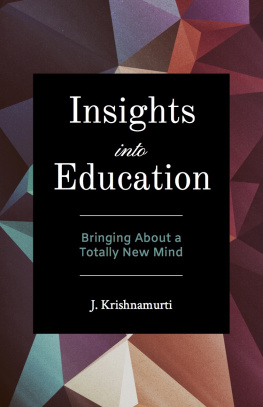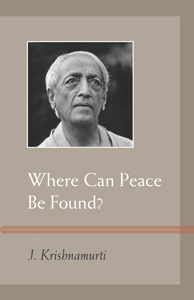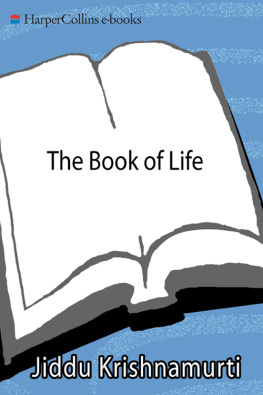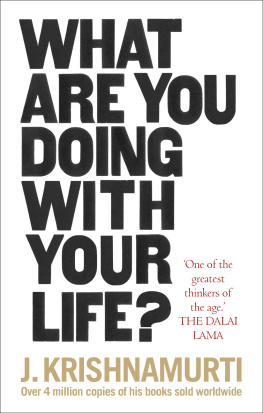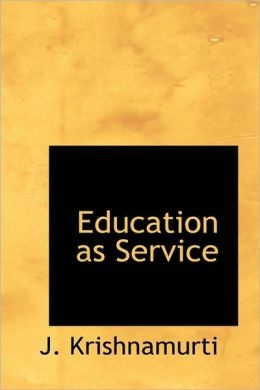Krishnamurti - Education and the Significance of Life
Here you can read online Krishnamurti - Education and the Significance of Life full text of the book (entire story) in english for free. Download pdf and epub, get meaning, cover and reviews about this ebook. City: New York, year: 1953;2010, publisher: HarperCollins e-books, genre: Religion. Description of the work, (preface) as well as reviews are available. Best literature library LitArk.com created for fans of good reading and offers a wide selection of genres:
Romance novel
Science fiction
Adventure
Detective
Science
History
Home and family
Prose
Art
Politics
Computer
Non-fiction
Religion
Business
Children
Humor
Choose a favorite category and find really read worthwhile books. Enjoy immersion in the world of imagination, feel the emotions of the characters or learn something new for yourself, make an fascinating discovery.

- Book:Education and the Significance of Life
- Author:
- Publisher:HarperCollins e-books
- Genre:
- Year:1953;2010
- City:New York
- Rating:5 / 5
- Favourites:Add to favourites
- Your mark:
- 100
- 1
- 2
- 3
- 4
- 5
Education and the Significance of Life: summary, description and annotation
We offer to read an annotation, description, summary or preface (depends on what the author of the book "Education and the Significance of Life" wrote himself). If you haven't found the necessary information about the book — write in the comments, we will try to find it.
Education and the Significance of Life — read online for free the complete book (whole text) full work
Below is the text of the book, divided by pages. System saving the place of the last page read, allows you to conveniently read the book "Education and the Significance of Life" online for free, without having to search again every time where you left off. Put a bookmark, and you can go to the page where you finished reading at any time.
Font size:
Interval:
Bookmark:
J. KRISHNAMURTI
EDUCATION AND THE
SIGNIFICANCE OF LIFE

 CONTENTS
CONTENTS

EDUCATION AND THE
SIGNIFICANCE OF LIFE
WHEN one travels around the world, one notices to what an extraordinary degree human nature is the same, whether in India or America, in Europe or Australia. This is especially true in colleges and universities. We are turning out, as if through a mould, a type of human being whose chief interest is to find security, to become somebody important, or to have a good time with as little thought as possible.
Conventional education makes independent thinking extremely difficult. Conformity leads to mediocrity. To be different from the group or to resist environment is not easy and is often risky as long as we worship success. The urge to be successful, which is the pursuit of reward whether in the material or in the so-called spiritual sphere, the search for inward or outward security, the desire for comfortthis whole process smothers discontent, puts an end to spontaneity and breeds fear; and fear blocks the intelligent understanding of life. With increasing age, dullness of mind and heart sets in.
In seeking comfort, we generally find a quiet corner in life where there is a minimum of conflict, and then we are afraid to step out of that seclusion. This fear of life, this fear of struggle and of new experience, kills in us the spirit of adventure; our whole upbringing and education have made us afraid to be different from our neighbour, afraid to think contrary to the established pattern of society, falsely respectful of authority and tradition.
Fortunately, there are a few who are in earnest, who are willing to examine our human problems without the prejudice of the right or of the left; but in the vast majority of us, there is no real spirit of discontent, of revolt. When we yield uncomprehendingly to environment, any spirit of revolt that we may have had dies down, and our responsibilities soon put an end to it.
Revolt is of two kinds: there is violent revolt, which is mere reaction, without understanding, against the existing order; and there is the deep psychological revolt of intelligence. There are many who revolt against the established orthodoxies only to fall into new orthodoxies, further illusions and concealed self-indulgences. What generally happens is that we break away from one group or set of ideals and join another group, take up other ideals, thus creating a new pattern of thought against which we will again have to revolt. Reaction only breeds opposition, and reform needs further reform.
But there is an intelligent revolt which is not reaction, and which comes with self-knowledge through the awareness of ones own thought and feeling. It is only when we face experience as it comes and do not avoid disturbance that we keep intelligence highly awakened; and intelligence highly awakened is intuition, which is the only true guide in life.
Now, what is the significance of life? What are we living and struggling for? If we are being educated merely to achieve distinction, to get a better job, to be more efficient, to have wider domination over others, then our lives will be shallow and empty. If we are being educated only to be scientists, to be scholars wedded to books, or specialists addicted to knowledge, then we shall be contributing to the destruction and misery of the world.
Though there is a higher and wider significance to life, of what value is our education if we never discover it? We may be highly educated, but if we are without deep integration of thought and feeling, our lives are incomplete, contradictory and torn with many fears; and as long as education does not cultivate an integrated outlook on life, it has very little significance.
In our present civilization we have divided life into so many departments that education has very little meaning, except in learning a particular technique or profession. Instead of awakening the integrated intelligence of the individual, education is encouraging him to conform to a pattern and so is hindering his comprehension of himself as a total process. To attempt to solve the many problems of existence at their respective levels, separated as they are into various categories, indicates an utter lack of comprehension.
The individual is made up of different entities, but to emphasize the differences and to encourage the development of a definite type leads to many complexities and contradictions. Education should bring about the integration of these separate entitiesfor without integration, life becomes a series of conflicts and sorrows. Of what value is it to be trained as lawyers if we perpetuate litigation? Of what value is knowledge if we continue in our confusion? What significance has technical and industrial capacity if we use it to destroy one another? What is the point of our existence if it leads to violence and utter misery? Though we may have money or are capable of earning it, though we have our pleasures and our organized religions, we are in endless conflict.
We must distinguish between the personal and the individual. The personal is the accidental; and by the accidental I mean the circumstances of birth, the environment in which we happen to have been brought up, with its nationalism, superstitions, class distinctions and prejudices. The personal or accidental is but momentary, though that moment may last a lifetime; and as the present system of education is based on the personal, the accidental, the momentary, it leads to perversion of thought and the inculcation of self-defensive fears.
All of us have been trained by education and environment to seek personal gain and security, and to fight for ourselves. Though we cover it over with pleasant phrases, we have been educated for various professions within a syste which is based on exploitation and acquisitive fear. Such a training must inevitably bring confusion and misery to ourselves and to the world, for it creates in each individual those psychological barriers which separate and hold him apart from others.
Education is not merely a matter of training the mind. Training makes for efficiency, but it does not bring about completeness. A mind that has merely been trained is the continuation of the past, and such a mind can never discover the new. That is why, to find out what is right education, we will have to inquire into the whole significance of living.
To most of us, the meaning of life as a whole is not of primary importance, and our education emphasizes secondary values, merely making us proficient in some branch of knowledge. Though knowledge and efficiency are necessary, to lay chief emphasis on them only leads to conflict and confusion.
There is an efficiency inspired by love which goes far beyond and is much greater than the efficiency of ambition; and without love, which brings an integrated understanding of life, efficiency breeds ruthlessness. Is this not what is actually taking place all over the world? Our present education is geared to industrialization and war, its principal aim being to develop efficiency; and we are caught in this machine of ruthless competition and mutual destruction. If education leads to war, if it teaches us to destroy or be destroyed, has it not utterly failed?
To bring about right education, we must obviously understand the meaning of life as a whole, and for that we have to be able to think, not consistently, but directly and truly. A consistent thinker is a thoughtless person, because he conforms to a pattern; he repeats phrases and thinks in a groove. We cannot understand existence abstractly or theoretically. To understand life is to understand ourselves, and that is both the beginning and the end of education.
Next pageFont size:
Interval:
Bookmark:
Similar books «Education and the Significance of Life»
Look at similar books to Education and the Significance of Life. We have selected literature similar in name and meaning in the hope of providing readers with more options to find new, interesting, not yet read works.
Discussion, reviews of the book Education and the Significance of Life and just readers' own opinions. Leave your comments, write what you think about the work, its meaning or the main characters. Specify what exactly you liked and what you didn't like, and why you think so.







